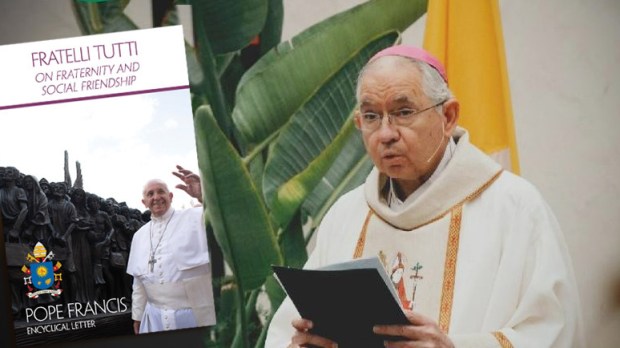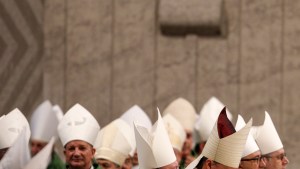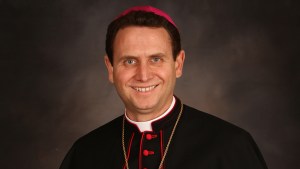Helping Catholics deepen their faith in the Eucharist and helping the Church see how it can foster unity in a polarized society were prominent themes during the first public session of the fall general assembly of the U.S. Catholic bishops conference.
In its first in-person meeting since the beginning of the COVID-19 pandemic, the United States Conference of Catholic Bishops engaged in a discussion about a Eucharistic revival in America in the face of declining belief in one of the Church’s central doctrines. The conference also learned more about Pope Francis’ desire to guide the Church throughout the world toward being a more “synodal” Church, one that listens to various viewpoints as well as divine inspiration and makes decisions in a more collaborative way.
The fall general assembly, taking place in Baltimore, began Monday with executive sessions that were closed to the public and the media. But the day was capped with a Mass concelebrated in the Basilica of the National Shrine of the Assumption of the Blessed Virgin Mary, a historic church where American bishops met throughout the 19th century — meetings which produced, among other things, the so-called Baltimore Catechism.
Los Angeles Archbishop Jose H. Gomez, president of the Conference, in an address the next day, invoked a key figure from that era, Archbishop John Ireland of St. Paul, Minnesota, whose thoughts on how the Church could shape American society in the 20th century have resonance today.
“The challenge we have is to understand how the Church should carry out her mission in an America that is now highly secularized,” Gomez said.
In spite of the many challenges the Church faces, Gomez believes there are new opportunities to preach the Gospel.
“There is a spiritual awakening going on in America, underneath all the clouds of the pandemic, all the uncertainty about where our country is heading,” he said. “People are starting to examine what they truly believe and what they value most deeply in their lives…. It is because we are living in a moment when American society seems to be losing its ‘story.’”
That “story” previously was rooted in a biblical worldview, he said. But now there are signs that that narrative is breaking down.
“Many of our neighbors are searching,” he said. “They are looking for a new story to give meaning to their lives, to tell them what they are living for and why. … What they need is to hear the true story — the beautiful story of Christ’s love for us, his dying and rising from the dead for us.”
The archbishop said that with “all the disruptions of the pandemic, all the social unrest of these past two years, people can now see very clearly that a world without God cannot bring them happiness and meaning. Our brothers and sisters are searching for God, and they are willing to let themselves be found by God.”
Gomez said that the American Church’s current work on a Eucharistic revival is the kind of missionary work that will address society’s longing for meaning and direction. He asked his brother bishops to publicly share their own stories of how they discovered “the friendship of Jesus and the love of God in this beautiful sacrament.”
The Eucharist, he added, is the “gateway key” to a “civilization of love.”
“Jesus promised that he would be truly present in the sacrament of the altar — but also in the flesh and blood of our neighbors, especially those who are poor and suffering.
“If we ever hope to end human indifference and social injustice, then we need to revive this sacramental awareness,” he continued. “In every human person we meet…we must see the image of the living God.”
Explaining synodality
Pope Francis’s “ambassador” to the United States, Archbishop Christophe Pierre, also addressed the Tuesday morning session, using his time to explain the concept of synodality. The pope has called for the Church to enter into a three-year examination of this concept and its relevance for the Church.
The word synodality comes from the Greek word synodos, which means “to be on the journey together,” said Archbishop Pierre, papal nuncio to the U.S. He said that in a book called Let Us Dream, Francis explained that synodality does not involve changing traditional doctrine but is about how teaching can be believed and applied in our times. It does not entail a debate where one side defeats the other.
Archbishop Pierre said he believes synodality is an answer to the “confrontation which is threatening to divide this country, and which also has its echoes in the Church.”
An example of synodality can be found in an area that has consumed the Catholic Church in America for the past 50 years: abortion and the pro-life response. Acting synodally, Pierre said, would involve trying to understand why people seek to end a pregnancy rather than simply arguing against abortion. It would seek to understand “the root causes of choices against life and … the factors that make those choices so complicated for some. This discernment, he said, would begin to form a consensus with concrete strategies “to build the culture of life and the civilization of love.”
As such, an initiative that the bishops are supporting called Walking With Moms in Need is a synodal approach which “seeks to walk with women, to better understand their situations; to work with pro life and social service agencies to meet the concrete needs of expectant mothers and their children,” the nuncio said. “Many expectant mothers are often suffering from loneliness, and common events such as baby showers, are not part of their reality. Parishes, by listening to what some of the spiritual, social, and emotional needs of the people are, can accompany women — even with small acts of kindness. Concrete gestures, not mere ideas, show forth the maternal, tender face of the Church that is truly pro-life.”
“Synodality is a way of living the faith in a permanent way at every level: in your dioceses, parishes, the family, and at the peripheries,” Pierre told the bishops. “All Church members are to be engaged in this way of living to support the mission of evangelization.”
Quoting Pope Francis again, he said, “A synodal Church is one that listens and ‘which realizes that listening is more than simply hearing.’” … The Church needs this listening more than ever if she is to overcome polarization in this country.”



